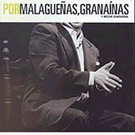Letra, Lyric
Levantica
Miner songs, one of the less known, coming from the Taranta, like the Murciana, the Taranto and the Minera, and like the Cartagenera coming from a folkloric fandango typical of Cartagena. The miner used to sing it when the went to work. Also known as the Madrugá song, coming from the primitive Taranta, sung in Almeria, Linares and La Union.
Libre, Free
Styles interpreted wihtout an external precise metre.
Ligado, Legato
Portato in music denotes slurred staccato and is notated by adding a slur to staccato notes.
Portato (from Latin: portare, = to carry) is actually articulated legato, where the notes are played almost legato. Each portato note is 'carried' to the next note.
Livianas
It is a flameno song coming from the seguiriyas group. Typical from the South, clear and simple, the livianas haven'tany Arabic or Hebraic influence. They talk about the Andalusian country with a genuine emotion. Born without guitar, no accompaniment, in the throat of the countryman. The ones who created this kind of song sung it like a prelude or preparation to an other country style song: the Serrana.
The Serrana and Livianas merged into one song, with a guitaristic rhythm of the seguiriya, it needs to be sung experts with fabulous abilities.
After that, the Liviana disappeared, we only practise the Serrana; but some of the old cantaores til sing it. Today we receive that song as an individual song, with a popular and rural flavor.
Lorqueñas
Macho
Refrain that we sing to end some songs.
Malagueñas, The
Malagueñas is one of the traditional styles of flamenco, derived from earlier types of fandango from the area of Málaga, classified among the Cantes de Levante. Originally a folk-song type, it became a flamenco style in the 19th century. It is not normally used for dance, as it is generally interpreted with no regular rhythmic pattern, as a "cante libre". It has a very rich melody with virtuous flourishes and use of microtones. Its guitar accompaniment is normally played in open position first inversion giving E for the tonic, which can be transposed by using a capo.
Malagueñas derive from local variety of the Fandangos, a type of dance that, with different regional variations and even different names, became very popular in great part of Spain in the 18th century. Although nowadays malagueñas are a typical instance of "cante libre", performed at libitum and normally not used for the dance, folkloric fandangos were originally sung and played at a fast speed, with a rhythmic pattern in 6/8, to accompany dance. Some of these primitive fandangos from Málaga, called Verdiales are still performed nowadays at folkloric gatherings by large non-professional groups called "Pandas", which use a high number of guitars, "bandurrias" (a sort of mandoline), violins, and tambourines.
Marianas
Coming from the "aflamencamiento" of an Andalusian song. A flamenco palo, music style: singing and Spanish dancing. Binary palo, from de tangos group. The popular acceptance if this song begun on the XX. Century.
Martinete
Coming from the Tonás group (a palo seco), possible accompaniment of the anvil and the hammer. A flamenco palo, musical style: singing and Spanish dancing. Generally a song with copla of four octosyllable verses.
Generally with sad content, with long whines.


